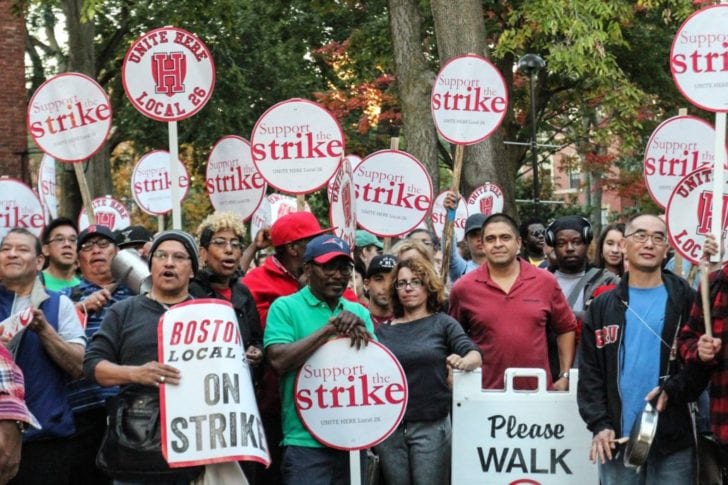
If Mass journalists were doing their jobs, Baker would not be so popular
May 1, 2018
BY JASON PRAMAS @JASONPRAMAS
It’s always funny to hear that Charlie Baker is a very popular governor… The most popular governor in the country at the moment, according to polls. Because he doesn’t do anything very differently than his predecessor Deval Patrick did. Or than Mass House speaker Robert DeLeo does. Or than most any state Democratic leader when it comes down to core economic issues—with the exception of the leaders with little actual power.
Baker, Patrick, DeLeo, and all their ilk in both major parties essentially follow the same game plan. They work to lower taxes for those most able to afford them, cut desperately needed social programs to the bone, and give away as much money as possible to giant corporations.
Much of the rest of what they do is posturing for the various constituencies that make up their particular electorates. And that’s the stuff that gets the most media coverage. Which is not to say they’re necessarily insincere about such activity. But they’re elected to represent the wealthy interests that run the Commonwealth, and the work they do for that most important constituency is always their top priority.
So when Patrick and Baker, for example, shovel over $1.5 billion in free public money at the biotech industry or arrange millions in tax breaks and direct state aid for huge companies that don’t need them on an ongoing basis—with DeLeo’s blessing in both administrations—to the extent those acts get coverage, they’re presented as done deals that are “good for the economy.” Then it’s on to the next press spectacle of the day. Events where they can “show leadership” and the like. As when there’s a snowstorm. In Massachusetts, a northern state noted for its frequent snowstorms. And the current governor gets on TV and says “stay indoors during the snowstorm.” That is apparently showing leadership.
Which explains Baker’s high numbers, I think. Simple public relations. Accentuate the positive, eliminate the negative, and all that. With most of the major news outlets gamely playing along. And his numbers are higher than Patrick’s were because he’s a white guy in a super racist state that likes to think it’s super anti-racist.
That’s what results in people that don’t pay attention to politics—including the vast majority of white voters—going, “Oh, Baker’s such a nice man” when pollsters ask their opinion of him. More than they did with Patrick. No doubt Baker is a nice man in person or whatever. Lots of people who do bad things when they have power are personally “nice.” Like, I’m sure when some buddy of his from childhood needs money, he’ll give it to him. Or at least loan it to him. But when all the legions of people he doesn’t know personally need good jobs with benefits, need free higher education, need major improvement to infrastructure like the MBTA—because of entrenched structural inequality—that’s a different story.
A story whose narrative you can hear if you listen to Baker’s remarks to the 2018 Mass Republican Convention in Worcester last weekend.
Stripping away obligatory pleasantries and nods to major supporters, the speech was aimed at the same white middle-class suburbanites who remain the base of the state Republican Party. Baker addressed them directly at one point while enumerating the “successes” of his administration: “We offered early college programs, our Commonwealth Commitment program, which dramatically reduces the cost of a college education. And increases in state scholarships to make the price of college more affordable for moderate- and middle-income families.”
See, he thinks they’re so important he mentioned them twice in a row: “moderate- and middle-income families.” No word about low-income families, though. At all. Not even a nod. Sure, working families are discussed. But in Republican-speak, “working families” isn’t code for “working class” as it often is for Democrats. It means “those who work.” As opposed to “those who do not work.” Like all those “lazy shiftless” folks that used to be called working class in more honest times. And those totally nonindustrious [ha!] immigrants. And the “undeserving” poor in general. Everyone who supposedly lives off the bounty of “our”––the good “moderate- and middle-income” people’s, the “taxpayers’”—labor.
But no mention of his most important constituency, the one he actually works for, either. “Small business” is mentioned a number of times. But not major corporations and the rich people that own them.
Still, they’re there. Lurking behind all of Baker’s remarks. Especially when he said several things that are completely and obviously false to anyone who follows politics reasonably closely. Like taking credit for “dramatically” reducing the cost of a college education. When public higher education is an absolute disaster in Massachusetts. When both the working-class families he seemingly deplores and the middle class he purports to represent—immigrant and nonimmigrant alike—are forced to run up ruinous amounts of debt just to put kids through schools that were once so cheap as to nearly be free. While tuition and fees keep getting raised year after year. Under both Democratic and Republican administrations.
The rich and the corporations are there because public higher ed, like virtually every other beneficial government program, is being starved for operating funds. To fatten that 1 percent’s coffers. Because politicians like Baker make a virtue out of cutting taxes. Slashing budgets. Laying off public workers. Privatizing anything they can get away with. As Baker himself has certainly been doing at the much-beleaguered MBTA. Another public service he addressed in Worcester, saying: “We took on the special interests at the MBTA. Created a Fiscal Management and Control Board. And saved taxpayers hundreds of millions of dollars, and we’re rebuilding its core infrastructure.” While, in the real world, that same public transportation infrastructure continues to fall apart for lack of the needed direct infusion of state funds.
Is everything Baker does bad? No. Is he as dangerous as federal counterparts like President Donald Trump? Or the feral reactionary theocrat Scott Lively that fully 28 percent of Mass Republican delegates just chose to run against Baker in a primary this fall? No. Not yet at least.
But that’s not the point.
The point is that a polity where a Charlie Baker can be incredibly popular is a broken polity. And a news media that enables him is a broken news media. Baker does not represent even the interest of the white middle class that keeps voting him into office, let alone the working class as a whole. A media that was doing its job would make that patently clear. Every hour of every day. Yet it does the opposite. Because it too is controlled by the same rich and powerful interests that control politics and ensure pols like Baker keep getting elected. Whether those pols call themselves Republicans or Democrats.
So to fix politics, we have to fix the media. And I can’t address how that might be done in a single column. But my colleagues and I are trying our damndest to do it in practice at DigBoston and the Boston Institute for Nonprofit Journalism. And the fix starts with journalists who are independent and strive to tell the truth about problems in media and the political system. Every hour of every day. Beyond that, there’s much more to say. So, I’ll plan to talk about specific potential fixes in future columns and editorials.
Apparent Horizon is syndicated by the Boston Institute for Nonprofit Journalism. Jason Pramas is BINJ’s network director, and executive editor and associate publisher of DigBoston. Copyright 2018 Jason Pramas. Licensed for use by the Boston Institute for Nonprofit Journalism and media outlets in its network.

![Students at rally at Boston City Hall by NewtonCourt (Own work) [CC BY-SA 4.0], via Wikimedia Commons](http://1fkoby17rlj41m4giv3x4cvk-wpengine.netdna-ssl.com/wp-content/uploads/2017/10/Students_at_rally_at_Boston_City_Hall_144819274-1.jpg)







